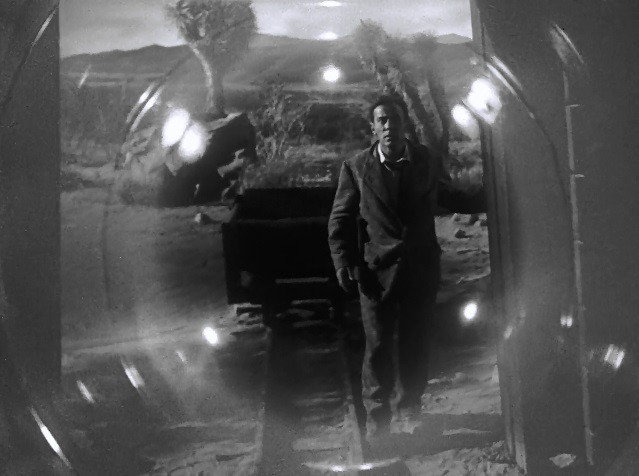The trailer for It Came from Outer Space really wanted to let you know how awesome its 3-D effects are:
Pity that the version I watched missed them. What remains is a plodding, dull, dragging story that takes far too long to get to the conclusion.
A meteor falls to Earth near Sandy Hook, Arizona and a local amateur astronomer and his school teacher fiancee get their neighbour to take his helicopter to take a look at it. He climbs into the crater and discovers it’s actually a crashed space ship, but before he can show it to the other two the crater collapses and the ship vanishes underground. Already tought of as a bit of a heads in the clouds egghead, nobody believes him, certainly not the local sherrif. But then people start disappearing, some coming back but not entirely themselves. When the astronomer’s fiancee disappears too, the sheriff organises a posse to capture or kill the aliens. Meanwhile our astronomer hero himself has managed to make contact with the aliens and realises they are not hostile, just ‘borrowed’ the towns people to help them make repairs to the ship. The climax is a race against time as the posse closes in and the astronomer tries to stop them long enough for the aliens to get away.
This could’ve just as well been told as an half hour Outer Limits or Twilight Zone episode, instead of an eighty minute movie. There’s too little plot for too much time and the suspense doesn’t hold up for me. I do like that the aliens here are mostly benign, if rather impolite to kidnap and then duplicate people without consent. You can’t argue the paranoid sheriff is entirely in the wrong to mistrust their motives. This being based on a Ray Bradbury idea I have the feeling that the moral is supposed to be that humanity has to grow up before being able to actually meet other civilisations, but the aliens didn’t cover themselves in glory either.

Shot in black and white in 1953, based on an idea of Ray Bradbury, this is at least a good looking movie. Not sure how much difference the 3-D effects would’ve made, but in the 2-D version they are sparse. We get shots of the ship crashing and leaving, but the most ambitious scene is when the astronomer finally comes face to face with an actual alien, rather than an alien possessed human. We first get a shot of him through the alien’s eye, then slowly his body is revealed to the astronomer and us. While it looks a bit naff, it’s at least an attempt at a non-human looking alien.
It Came from Outer Space can be seen as part of that 1950ties wave of Cold War paranoia sci-fi movies, but doesn’t fit neatly in it. The aliens do not kill or hurt anybody, are ultimately benign and not here to take over. They just want to go home.
Sci-Fi Sundaze is an attempt to get me to watch more classic science fiction movies and blog about them. Sci-fi is a bit of a curse word in echt-fandom circles of course, something Forry Ackerman couldn’t have expected when he coined it to give science fiction a cool new name ala hi-fi. Sci-fi is shlock, all the bad stuff ‘we’ left behind in the pulps, proof that media sf could never catch up to the written stuff. That’s all bollocks of course.
What I’m interested in is taking a closer look at three long maligned waves of sci-fi schlock. First, like with this entry, that whole flood of quickly and cheaply made 1950ties science fiction thrillers, the purest expression of ‘sci-fi’. Second, there are the pre-Star Wars seventies dystopias like Rollerball or Logan’s Run. Sometimes these had little more going for them than awesome sets, but it’s still worth looking closer at them. Finally, there’s the eighties science fiction boom. Star Wars, Close Encounters of the Third Kind and Alien had made science fiction a blockbuster genre and boy were people ready to cash in. So let’s look at all the Star Wars ripoffs, the nuclear war armageddon Mad Max clones, all the sci-fi horror movies winking at Aliens. These are the movies I’d get from the videoshop once I saw all the good sf movies.